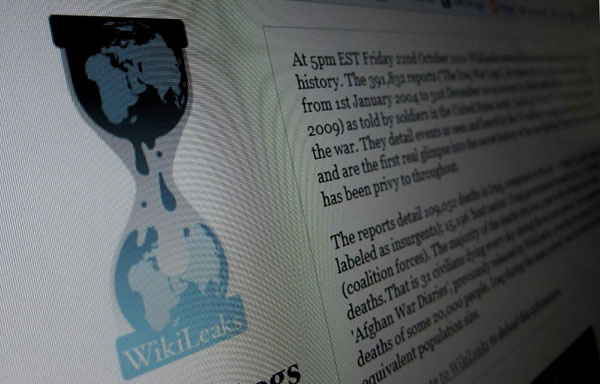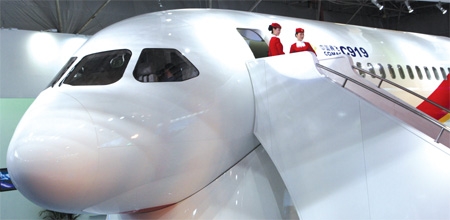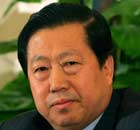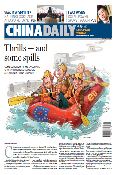WikiLeaks: Clinton ordered diplomats to spy
Updated: 2010-11-29 09:08
(Agencies)
|
 The home page of the Wikileaks.org website is pictured on a computer in Hoboken, New Jersey, Nov 28, 2010. State Department documents released by whistle-blowing website WikiLeaks provided candid views of foreign leaders and sensitive information on terrorism and nuclear proliferation, the New York Times reported on Sunday.[Photo/Agencies] |
WASHINGTON - US Secretary of State Hillary Clinton ordered American officials to spy on high ranking UN diplomats,according to leaked US diplomatic documents.
All permanent members of the security council – including Russia, China, France and the UK – were targeted by the secret spying mission, as well as the Secretary General of the UN, Ban Ki-Moon.
Le Monde said the memo asked US diplomats to collect basic contact information about UN officials that included Internet passwords, credit card numbers and frequent flyer numbers. They were asked to obtain fingerprints, ID photos, DNA and iris scans of people of interest to the United States, Le Monde said.
Another batch of documents raised questions about Italian Prime Minister Silvio Berlusconi and his relationship with Russian Prime Minister Vladimir Putin. One cable said Berlusconi "appears increasingly to be the mouthpiece of Putin" in Europe.
Italy's Foreign Minister Franco Frattini on Sunday called the release the "Sept 11 of world diplomacy," in that everything that had once been accepted as normal has now changed.
Der Spiegel reported that the cables portrayed German Chancellor Angela Merkel and Foreign Minister Guido Westerwelle in unflattering terms. It said American diplomats saw Merkel as risk-averse and Westerwelle as largely powerless.
"IRAN NUCLEAR PROGRAM MUST BE STOPPED"
King Abdullah of Saudi Arabia repeatedly exhorted the United States to "cut off the head of the snake" by launching military strikes to destroy Iran's nuclear program, according to leaked US diplomatic cables.
A copy of the cable dated April 20, 2008, was published in the New York Times website on Sunday after being released by the whistleblowing website WikiLeaks. The classified communication between the US Embassy in Riyadh and Washington showed the Saudis feared Shi'ite Iran's rising influence in the region, particularly in neighboring Iraq.
The United States has repeatedly said that the military option is on the table, but at the same time US military chiefs have made clear they view it as a last resort, fearing it could ignite wider conflict in the Middle East.
The April 2008 cable detailed a meeting between General David Petraeus, the top US military commander in the Middle East, and then US ambassador to Iraq, Ryan Crocker, and King Abdullah and other Saudi princes.
At the meeting, the Saudi ambassador to the United States, Adel al-Jubeir "recalled the King's frequent exhortations to the US to attack Iran and so put an end to its nuclear weapons program," the cable said.
"He told you to cut off the head of the snake," Jubeir was reported to have said.
The Saudi foreign minister, Prince Saud al-Faisal, however, pushed for tougher sanctions instead, including a travel ban and further restrictions on bank lending, although he did not rule out the need for military action.
The WikiLeaks documents also show US Defense Secretary Robert Gates believes any military strike on Iran would only delay its pursuit of a nuclear weapon by one to three years, the Times reported.
Saudi Arabia, one of the world's top oil producers, is concerned about Iran's growing military strength. The United States announced last month that it plans to sell the kingdom $60 billion worth of military aircraft to help it bolster its defenses.
Britain's Guardian newspaper, one of a number of publications to have had access to the leaked diplomatic cables, said the communications also showed that other Arab allies have secretly agitated for action against Tehran over its disputed nuclear program.
Another cable, sent from the US Embassy in Manama, Bahrain, on November 4, 2009, detailed a meeting between Petraeus and King Hamad bin Isa al-Khalifa, whose kingdom is the headquarters of the US Navy's Fifth fleet. Like Saudi Arabia it is a Sunni Muslim-ruled kingdom.
King Hamad argued "forcefully for taking action to terminate (Iran's) nuclear program, by whatever means necessary," the cable said.
"That program must be stopped," he was quoted as saying. "The danger of letting it go on is greater than the danger of stopping it."
According to an April 2006 cable from the US embassy in Abu Dhabi, the United Arab Emirates believed "the threat from al Qaeda would be minor if Iran has nukes," but that it was reluctant to take any action that might provoke its neighbor.
The emirate's rulers told US officials they should only seek their help as a "very last resort. If you can solve something without involving the UAE, please do so," the cable said.
Iran denies its nuclear program is a cover to build a nuclear bomb and says it is purely for peaceful purposes.
A UN Security Council resolution passed in June, imposing a fourth round of sanctions, renewed a call on Iran to suspend uranium enrichment, something Tehran has explicitly refused to do, saying such activity is its right under international law.
The top US military officer, Admiral Mike Mullen, said in comments released on Friday that the US military has been thinking about military options on Iran "for a significant period of time", but he stressed that diplomacy remained the focus of US efforts.
Libyan leader Moammar Gadhafi, meanwhile, was described as erratic and in the near constant company of a Ukrainian nurse who was described in one cable as "a voluptuous blonde," according to the Times.
The Obama administration has been bracing for the release for the past week. Top officials have notified allies that the contents of the diplomatic cables could prove embarrassing because they contain candid assessments of foreign leaders and their governments, as well as details of American policy.
The State Department's top lawyer warned WikiLeaks founder Assange late Saturday that lives and military operations would be put at risk if the cables were released. Legal adviser Harold Koh said WikiLeaks would be breaking the law if it went ahead. He also rejected a request from Assange to cooperate in removing sensitive details from the documents.
In a session Sunday with a group of Arab journalists, Assange said, "The State Department understands that we are a responsible organization, so it is trying to make it as hard as it can for us to publish responsibly."
He called the Obama administration "a regime that doesn't believe in the freedom of the press and doesn't act like it believes it."
The New York Times said the documents involved 250,000 cables — the daily message traffic between the State Department and more than 270 US diplomatic outposts around the world. The newspaper said that in its reporting, it attempted to exclude information that would endanger confidential informants or compromise national security.
The Times said that after its own redactions, it sent Obama administration officials the cables it planned to post and invited them to challenge publication of any information they deemed would harm the national interest. After reviewing the cables, the officials suggested additional redactions, the Times said. The newspaper said it agreed to some, but not all.
Paper's Digest

Chinese jet takes on Big 2
First large commercial plane set to ride on demand for aircraft as economy grows.
Super-CPU only for domestic eyes
Specials

Chinese jet takes on Big 2
First large commercial plane set to ride on demand for aircraft as economy grows.

Gaining ground
Doing business in china for westerners has come a long way, Peter batey says.

Safeguarding environment a priority
China continues to face mounting pressure to curb environmental degradation, despite progress in reducing pollution over the last five years, the environmental protection minister warned.
